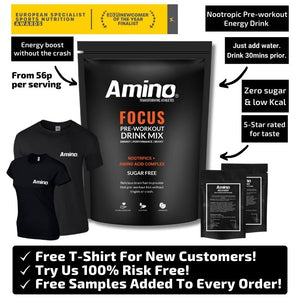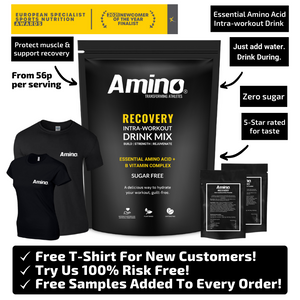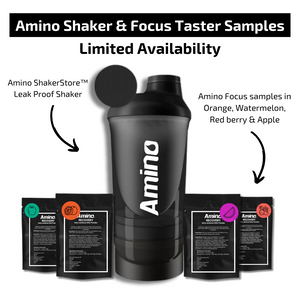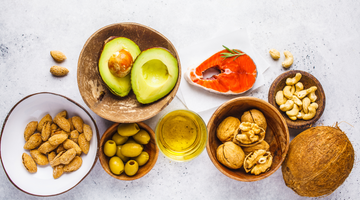Before delving into how amazing Vitamin D and Magnesium are, I thought I would quickly take a step back and talk a little about supplements in general.
When it comes to supplements, there are 3 types of people, you're either anti-supplements (taking a naturalist approach), or all for supplements (replacing real food with them), or like us somewhere in the middle (using them mindfully to optimise your health).
Furthermore, everyone is different, a mum working full-time will need a different nutrient programme to a semi-pro athlete. So this means that deciding on what nutrients you need requires research and experimenting with what works for you personally, which takes time and effort.
So...should you supplement?
Generally speaking, we believe in getting the majority of your nutrients from the food you eat. That’s why when thinking about supplements it is important to start with a nutrient-dense diet and then from there, look to optimise by supplementing nutrients according to your specific needs and goals at any point in time. Some things that will help inform your decisions are the intensity of your training programme, dietary restrictions, your stress levels, current injuries and health issues.
That being said, when you think about the lives we all lead these days most of us are managing high levels of physical and/or mental stress. So even if your diet is pretty good it’s pretty likely that you’ll be deficient in one nutrient at some point or another. Some common deficiencies in the UK are Iron, Iodine, Vitamin D, Vitamin B12, Calcium, Vitamin A and Magnesium.
Our two wonder supplements, Vitamin D and Magnesium
Vitamin D - for strong bones and muscles, balanced hormones, reduced inflammation and boosted immune function
Deficiency signs
Vitamin D deficiency is not usually obvious, and symptoms develop over time and are often wrapped up in other chronic health issues commonly experienced by the UK population.
Adults who are extremely deficient in vitamin D may experience muscle weakness, bone loss, and an increased risk of fractures. In children, it may cause growth delays and soft bones (rickets).
Foods high in Vitamin D
Vitamin D is added to fortified foods you can find at the grocery store, like milk, orange juice and cereal. But if you don’t tolerate dairy or want to avoid high-sugar cereal and fruit juice, add these foods to your diet instead:
- Cod liver oil.
- Fatty fish. Salmon, mackerel, sardines, and trout are rich in vitamin D.
- Egg yolks.
It is hard to get sufficient amounts through diet alone and so it is worth considering taking a supplement or increasing your sun exposure.
Supplements
Look for Vitamin D3 in tablets or liquid. 1,000-5,000 IU/day. A good starting point would be Solgar via H&B.
Also good to know is that Vitamins A, D, and K2 work in a complementary fashion for immune, heart, and bone support. So you could also consider a vitamin complex.
How much to take and when
Take it in the morning
due to it being inversely related to melatonin your sleep hormone. A daily dose* of roughly 1,000-5,000 IU/day or 20-80 IU per kg of body weight**
* The UK's recommended daily allowance for Vitamin D is currently set at 600 IU/day, but there is a lot of research to show that this is too low for adults. Research suggests that the true safe upper limit is 10,000IU/day. A good rule of thumb is to optimise your doses by your body weight as above.
**Your skin tone affects your dose. People with brown/black skin don’t convert sunlight into vitamin D as quickly as lighter-skinned people. If you’re brown-skinned, you may want to consider increasing the dose. No matter what your skin colour, always test your blood levels because your individual response to dosage varies.
Concerned about toxicity?
Vitamin D toxicity is a very rare condition. Research showed a daily intake ranging from 40,000–100,000 IU (1000–2500 mcg), for one to several months, has been shown to cause toxicity in humans.
This a great compilation on all the up to date studies on Vitamin D - https://examine.com/supplements/vitamin-d/
Magnesium - for mood, focus and sleep
Another extremely important nutrient for your body is Magnesium as it is used in over 300 biochemical processes, including all of those involved in energy production, protein synthesis, testosterone production, insulin sensitivity, calcium absorption and regulation of the sympathetic (fight or flight) nervous system.
Most of us are lacking in the essential mineral mainly due to soil depletion and poor farming practices, so it’s pretty difficult to get enough magnesium from food alone.
Stress (physical and mental), alcohol and certain common medications can really play havoc with your magnesium levels. And so it is easy to get caught in a vicious cycle of losing magnesium, reacting even more to stress, losing more magnesium, and so on. Therefore, without a doubt, everyone should consider supplementing with magnesium!
For more information check out the Poliquin Groups, The benefits of magnesium.
Deficiency signs
80% of the UK population are deficient in magnesium however a deficiency can be difficult to pinpoint as its symptoms can be common, and range from being mildly annoying to something more serious.
It may not be the first thing that springs to mind when you find yourself regularly short-tempered, struggling with your sleep or focus.
Fatigue, aches and pain, muscle cramps, mood balance, anxiety, migraines, PMS, Irregular sleep patterns and insomnia are other symptoms.
For more information check out the Poliquin Groups, 8 signs you need more magnesium.
Foods high in magnesium
- Dark chocolate. 1-ounce (28-gram) serving provides 64 mg.
- Avocados. One medium avocado provides 58 mg.
- Nuts (almonds, cashews, Brazil). 1-ounce (28-gram) serving of cashews contains 82 mg.
- Legumes (lentils, beans, chickpeas, peas and soybeans). 1-cup serving of cooked black beans contains 120 mg.
- Tofu. 3.5-ounce (100-gram) serving has 53 mg of magnesium.
- Seeds (flax, pumpkin and chia). 150 mg in a 1-ounce (28-gram) serving.
- Leafy Greens (kale, spinach, collard greens). 1-cup serving of cooked spinach has 157 mg.
Supplements
We suggest looking for magnesium citrate or magnesium glycinate as a place to start. Try Powder from MyProtein or Capsules from Solgar via H&B.
I have also found this article from Bulletproof useful in assessing the different magnesium supplements available and what might be best for you.
How much to take and when
In general, women need to consume about 320 mg of magnesium per day, and men need about 420 mg per day.
So depending on your personal lifestyle and diet we'd recommend taking 200-800 mg every day with your dinner or before bed. Start low and increase to find your level - your toilet habits will let you know if you've taken too much. Your body will take what it needs a get rid of the rest.
Check out Examine for a compilation of all the latest studies on magnesium - https://examine.com/supplements/magnesium/








